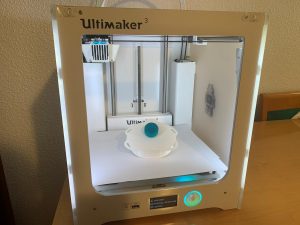UMH begins validation phase for a respiratory protection mask prototype for healthcare personnel
Campus, Elche, Fuente, Investigación, Investigaciones, Noticia, Others, Front UMH
7 April 2020
The Miguel Hernández University of Elche (UMH), through its Scientific Park, has begun the validation phase for a self-filtering respiratory protection mask prototype that provides, for both healthcare personnel and all people in contact with patients diagnosed with COVID-19, greater protection and minimizes the risk of spreading infection. This design was developed by technicians from the Prototyping Laboratory at the UMH Scientific Park, in close collaboration with medical managers, intensivist physicians, and prevention personnel from provincial hospitals, including the Vinalopó University Hospital and HLA Vistahermosa Clinic.
The mask is made of flexible and adjustable rubber, along with a removable and exchangeable HEPA H13 filtering system. Furthermore, it is ergonomic and airtight, which minimize the risk of infection among healthcare personnel, staff at senior care centers, etc.
Currently, this mask prototype is in the process of validation by the Textile Industry Research Association (AITEX), an entity dedicated to research, trials, and certification of articles and textiles. Following these validation tests, which will determine the level of effectiveness of the mask and certify the model, technicians at the Scientific Park (PCUMH) will then be able to begin manufacturing and distributing these innovative protection systems. The production process would initially be carried out by equipment on hand at the Prototyping Laboratory of the UMH Scientific Park, as well as by other devices supplied by individuals and companies. What’s more, other larger-scale production methods with collaboration by firms from the Province of Alicante are being explored.
This new proposal represents yet another of the initiatives launched by the UMH to help stop and/or mitigate the expansion of the pandemic its effects. Others include manufacturing an external securing system for pacemakers, which enables moving patients who have received temporary cardiac pacing to regular hospital rooms and freeing up ICU space, and participation in a research project that aims to anticipate coronavirus pneumonias by applying artificial intelligence, which could prevent serious consequences in patients.
